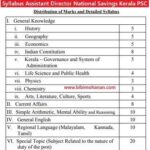GENERAL MANAGER KERALA STATE CO-OPERATIVE AGRICULTURAL AND RURAL DEVELOPMENT BANK LIMITED (Category No. 010/2022)
KSCARDB General Manager Detailed Syllabus
Join My Notebook Whatsapp Channel
010/2022 syllabus Kerala PSC
Total :100 Marks
Module 1. Capitalism, socialism and communism- cooperatives and other forms
of business organizations- distinctive features of cooperative organization vis-àvis-, partnership and joint stack companies- a cooperative as an institution and as an enterprise- cooperative common wealth. (2 marks)
Module 2. Principles of cooperation- Rochdale pioneers (I stage)- reformulated
principles by ICA (II stage)- Karve Committee on Cooperative Principles(III
stage)- Principles of ICA in 1995( IV stage)- distinction between Cooperative
values and cooperative principles. (3 marks)
Module 3. (i) Short term and medium term cooperative credit structure- primary
agricultural credit societies- urban cooperative Banks and state cooperative Banks,
(ii) Long term credit structure-PCARDBs and SCRABDs (iii) General Purpose
and special purpose agricultural marketing societies- primary marketing societies
and their federations including NAFED, rubber marketing societies and their
federations, dairy cooperative societies and their federations, fishery cooperatives
and their federations (iv) processing cooperatives-need and importance (v)Housing
cooperatives and their federations(vi) Consumer cooperatives and their federations
(vii) Industrial cooperatives and their federations- handlooms and power looms,
coir, handicrafts (viii) Workers cooperatives –significance of workers cooperatives
in Kerala. (3 marks)
Module 4. NAFED,IFFCO,KRIBCO,NABARD,NDDB,NCDC, and National
Housing Bank and other national organizations providing assistance to housing
cooperatives. (3 marks)
Module 5. Definition-objectives-scope-advantage-difference between audit of
cooperative societies and joint stock companies- special features of cooperative
audit- administrative set up for cooperative audit-types of audit-mechanical auditpreparations for audit and framing of audit programme-staged of practical auditmechanical audit, administrative audit, preparation of final statementreconciliation of bank accounts- cooperative auditor- duties, powers and liabilitiesaudit report- audit certificate- audit classification- assessment and levy of audit fees. (3 marks)
Module 6. Managing the social process in a cooperative, competition, conflict and
cooperation. Associative character of a cooperative and managing a cooperative
association. Issues in organizing a cooperative – size of the organization- small area
vs large area, single purpose vs multipurpose cooperatives- multipurpose vs
multifunctional cooperatives- unitary vs federal cooperatives- designer vs
greenhouse cooperatives- issues in financing a cooperative- evaluating a
cooperative organization- member dimension, enterprise dimension and ethical
dimension. (3 marks)
Module 7. arbitration and awards- provisions and procedures- execution and
enforcement of awards- provisions and procedures, appeals, review and revisionmeaning and distinction- authority of appeals- cooperative tribunal- constitution
and powers- offences and penalties- provisions and procedures. (2 marks)
Module 8. State aid to cooperatives-share capital contribution- principal state
partnership fund- subsidiary state partnership fund- grants- subsidies- owned
funds- borrowed funds. (3 marks)
Module 9. Evolution of cooperative legislation in India- the 1904 Act, the Act of
1912, transfer of cooperation as provincial subject, National development Council
Resolution 1956, the Model Cooperative Societies Bill 1957, the Model
Cooperative Societies Bill 1991 by Planning Commission- Trend towards parallel
Cooperative Laws- Andhra Pradesh Mutually Aided Cooperative Societies Act
1995, Multi State Cooperative Societies Act 1984 and its replacement in
2002.Evolutions of Cooperative legislation in Kerala and enactment of Kerala
Cooperative Societies Act 1969. (3 marks)
Module – 10
Introduction to accounting standards – IFRS converged accounting standardsApplicability of accounting standards – preparation of financial statement- cash
flow statement – Accounting for bonus and right issue- Investment accountsDepartment Accounts- Hire purchase – branch accounts- accounting for insurance
claims- Accounting for incomplete records (5 Marks)
Module – 11
Incorporation of a company, Prospectus and allotment of securities- share capital
and debentures- Company management and administration- deceleration and
payment of dividend- Accounts of companies- Audit and Auditors
( 5 Marks)
Module – 12
Material cost- Employee cost- Overheads- activity based costing- cost sheet- cost
accounting system- Unit and batch costing-job costing- contract costing- process
and operation costing- joint products and byproducts- service costing- standard
costing- marginal costing- budget and budgetary control
(5 marks)
Module – 13
Basic concepts- residence and scope of total income- income which do not form
part of total income- heads of income- income from salaries, house property- profit
and gains of business or profession, capital gains and other sources- set off and
carry forward- deductions- advance tax- filing of return of income and selfassessment (5 marks)
Module – 14
Audit strategy- Audit planning and audit programme- Audit documentation- audit
evidence- Risk assessment and internal control- Audit in automated environmentAudit sampling- company audit- Audit report- (5 marks)
Module – 15
Financing decisions- Investment decisions- Dividend decisions- ratio analysiscapital structure – Risk Analysis in Capital Budgeting- Introduction to Working
Capital Management- Treasury and Cash Management -Management of InventorManagement of Receivables – Management of Payables (Creditors)- Financing of
Working Capital (5 marks)
Module – 16
Introduction to strategic management- dynamic of competitive strategy- strategic
management process- corporate level strategies- business level strategiesfunctional level strategies- organisational level strategies- strategic leadershipstrategy implementation and control (5 marks)
Module 17 – Meaning, Nature, Scope and Objectives – Role of financial manager.
Time value of money -Risk-Return relationship – Sources of finance- Cost of
Capital – Meaning and concept-Significance-Calculation of specific costs and
composite cost (WACC) (8 marks)
Module 18- Capital structure- Theories and value of the firm – Net income
approach, Net operating income approach, Traditional approach, Modigliani Miller
Model- Determining the optimal capital structure-Concept of leverage- Types of
leverage: Operating leverage, Financial leverage, and Combined leverage- EBITEPS Analysis (8 marks)
Module 19 – Capital Budgeting Decisions, Techniques – Payback period, NPV,
IRR, Profitability Index-NPV v/s IRR, Risk analysis in Capital Budgeting
(Probability and Decision Tree Analysis) – Capital Rationing-Sensitivity Analysis
(8 marks)
Module 20 – Dividend Policy-Factors determining Dividend Policy, Theories of
dividend-Gordon Model, Walter Model, MM Hypothesis, Forms of dividendDividend policies in practice (8 marks)
Module 21- Concept of working capital- Factors affecting working capital
requirements – Working capital policies-Management of working capital –
Forecasting working capital requirements – Cash management – Receivables
management – Inventory management (8 marks)
Download PDF
- [PDF] Syllabus Law Officer Kerala State Co-operative Societies|192/2025 syllabus Kerala PSC
- [PDF] Syllabus Assistant Manager Kerala Welfare Fund Board KWFB| 433/2024 syllabus Kerala PSC
- Padma Awards 2026|Padma Vibhushan Awards 2026|Padma Bhushan Awards 2026|Padma Shri Awards 2026
- [PDF]Syllabus Assistant Director National Savings Kerala PSC|698/2025 Syllabus Kerala PSC
- [PDF] Syllabus HST Hindi|134/2025 syllabus Kerala PSC

